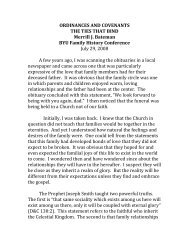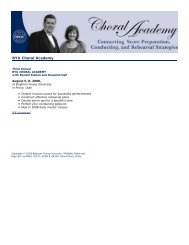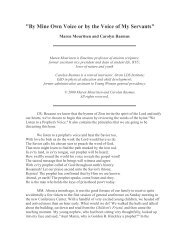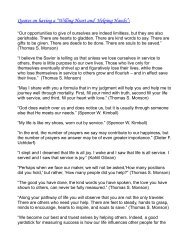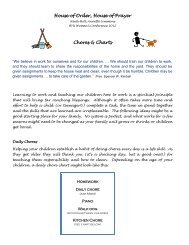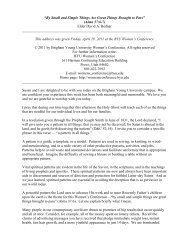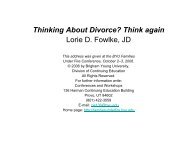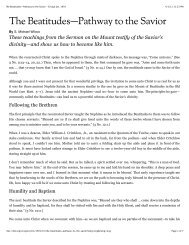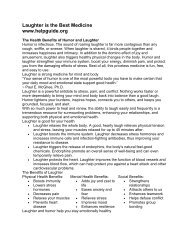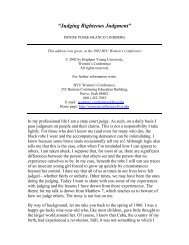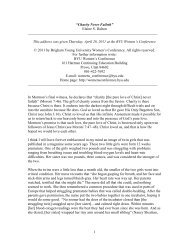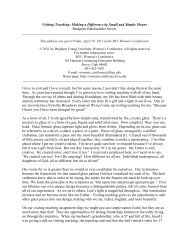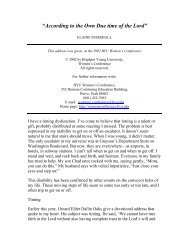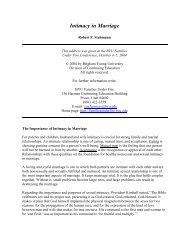Elder Bruce C. and Marie K. Hafen - Continuing Education - Brigham ...
Elder Bruce C. and Marie K. Hafen - Continuing Education - Brigham ...
Elder Bruce C. and Marie K. Hafen - Continuing Education - Brigham ...
Create successful ePaper yourself
Turn your PDF publications into a flip-book with our unique Google optimized e-Paper software.
“The Touch of Human Kindness: Women <strong>and</strong> the<br />
Moral Center of Gravity”<br />
<strong>Elder</strong> <strong>Bruce</strong> C. <strong>Hafen</strong> <strong>and</strong> Sister <strong>Marie</strong> K. <strong>Hafen</strong><br />
© 2001 <strong>Elder</strong> <strong>Bruce</strong> C. <strong>Hafen</strong> <strong>and</strong> Sister <strong>Marie</strong> K. <strong>Hafen</strong>.<br />
All rights reserved.<br />
Today's culture is losing the plot about marriage, motherhood, <strong>and</strong> family life. As our Primary children sing<br />
"Follow the Prophet," they sing this verse: "Now we have a world where people are confused. If you don't<br />
believe it, go <strong>and</strong> watch the news."1<br />
Church members aren't immune from this confusion. A Latter-day Saint mother who was called to work with<br />
young single adults was expecting a new baby. One by one, several of her young women privately asked her<br />
how she really felt about having another child. In a spirit of deep womanly trust, they asked questions that<br />
reflected honest anxiety about being bound to husb<strong>and</strong>s <strong>and</strong> assuming the burdens of motherhood. She told us<br />
she was surprised to hear concerns like this from young women who were believing, active Church members.<br />
In response, she invited each young woman to do what she had allowed only her husb<strong>and</strong> <strong>and</strong> children to do.<br />
She tenderly placed one of their h<strong>and</strong>s on her abdomen <strong>and</strong> invited them to feel the baby's movements. Then,<br />
with her h<strong>and</strong> on theirs, she lovingly taught each one that, despite the relentless dem<strong>and</strong>s, she had discovered<br />
an exquisite happiness through being married <strong>and</strong> having children. These young women drank with deep<br />
reassurance from her wellsprings of testimony. But today, people without mentors like that can be very<br />
confused.<br />
What is happening to us? We are now living through the biggest change in attitudes about family life in five<br />
centuries. An Atlantic Monthly writer believes today's massive family disintegration is part of what he calls<br />
"the Great Disruption," a wave of history as big as the shift from the age of agriculture to the Industrial<br />
Revolution some 200 years ago.2 And so today, many people are skeptical about the very idea of "belonging"<br />
to a family. After long seeing family bonds as valuable ties that bind, some now see those ties as sheer<br />
bondage.<br />
It feels like vast forces are eroding our foundations of personal peace, love, <strong>and</strong> human attachments. Whatever<br />
held family relationships together suddenly feels weaker now. At times it feels like a kind of ecological<br />
disaster, as if a vital organism somewhere in the environment is disappearing.<br />
Patricia Holl<strong>and</strong> once said, "If I were Satan <strong>and</strong> wanted to destroy a society, I think I would stage a full-blown<br />
blitz on women."3 What do you suppose she meant? Men <strong>and</strong> women share the traits of human nature <strong>and</strong><br />
often perform the same tasks. But some strengths are gender-specific. And we are losing, in this society, what<br />
women have traditionally contributed to cultural cohesion. Like the mortar that keeps a brick wall from<br />
toppling over, women have held together our most precious relationships—our marriages <strong>and</strong> child-parent ties.<br />
But now we're seeing cracks in that mortar, which reveal some things we have too long taken for granted.<br />
A salesman walked down a street past a group of boys playing baseball. No one answered at the door of the<br />
house where he was to call. Through a side door, he saw a boy about the age of those playing in the street<br />
dutifully practicing the piano. Baseball gear leaned against the wall. He called, "Excuse me, sonny, is your<br />
mother home?" The boy glanced at his baseball gear, <strong>and</strong> then he said glumly from the keyboard to the<br />
salesman, "What do you think?"
More broadly, studies of third-world development show that of all the factors that affect a culture's social <strong>and</strong><br />
economic growth, perhaps the most significant factor is the literacy of women. How interesting. Women have<br />
always lifted entire cultures. Their influence begins in every society's very core-the home. Here, women have<br />
taught <strong>and</strong> modeled what Tocqueville called "the habits of the heart," the civilizing "mores" or attitudes that<br />
create a sense of personal virtue <strong>and</strong> duty to the community-without which free societies can't exist.4<br />
Shakespeare's Macbeth teaches powerfully about the moral influence of women. He uses his phrase "the milk<br />
of human kindness" when Lady Macbeth is persuading her husb<strong>and</strong> to murder the king <strong>and</strong> take his throne. As<br />
Macbeth hesitates, his wife sneers, "Thy nature [is] too full o' th' milk of human kindness."5 Then, in a<br />
haunting passage, from her balcony, Lady Macbeth taunts the evil forces of the universe to "unsex me here"<br />
<strong>and</strong> "fill me . . . [with] direst cruelty. . . . Take my [woman's] milk for gall. . . . Come, thick night."6 Haunting<br />
lies.<br />
Lady Macbeth's womanly heart makes her incapable of taking a life unless she renounces her female instinct to<br />
give <strong>and</strong> nurture life. Later, after they have killed the king, she goes insane, <strong>and</strong> then she dies-not just from<br />
guilt, but perhaps from symbolically renouncing her nature.<br />
"The milk of human kindness" is a symbol of female nurturing at many levels, but it especially means the<br />
moral influence of women. Let's consider now four ways in which modern society has devalued that nurturing.<br />
Perhaps seeing more closely what we're losing will help us regain it. Let's look first at the devaluation of<br />
motherhood.<br />
For most of our history, the very word motherhood meant honor, endearment, <strong>and</strong> sacrifice. Victor Hugo<br />
wrote, "She broke the bread into two fragments <strong>and</strong> gave them to her children, who ate with eagerness. 'She<br />
hath kept none for herself,' grumbled the sergeant.<br />
"'Because she is not hungry,' said a soldier.<br />
"'No,' said the sergeant, 'because she is a mother.'"7<br />
Yet this spirit of self-sacrifice has, these days, become a contentious issue, making contentious the very idea of<br />
motherhood. For instance, a feminist essay called "The Problem of Mothering" tells us that "explorations of<br />
women's oppression [challenge] the social assignment of mothering to women [because] women's oppression<br />
is in some way connected to mothering."8 In other words, because mothering has been assigned to women, the<br />
feminist criticism is that women have been assigned to be oppressed. Others have attacked the sacrificing<br />
mother whose selflessness has allowed <strong>and</strong> encouraged male domination. They argue that stereotyping the<br />
motherly role forces women to accept a sexist division of labor everywhere, most especially in family<br />
relationships.9<br />
Now, these critics do have a point. Some people have exploited mothers' willingness to accept relentless<br />
dem<strong>and</strong>s. And some women have felt undue pressure to conform to rigid roles that deny a woman's sense of<br />
self. But the critics have swung the pendulum too far. As Newsweek put it, they "sometimes crossed the line<br />
into outright contempt for motherhood."10<br />
If being selfless means a woman must give up her own inner identity <strong>and</strong> personal growth, that underst<strong>and</strong>ing<br />
of selflessness is wrong. That was a weakness in some versions of the Victorian model of motherhood, which<br />
viewed women as excessively dependent on their husb<strong>and</strong>s. But today's liberationist model goes too far the<br />
other way, stereotyping women as excessively independent of their families.<br />
A more sensible view is that husb<strong>and</strong>s <strong>and</strong> wives are interdependent with each other. The Church's inspired<br />
Proclamation on the Family states that spouses are "equal partners" who "help one another" in fulfilling their<br />
individual roles.11 Marriage offers each partner the opportunity for spiritual development. I once said in<br />
frustration to <strong>Marie</strong>, "The Lord put Adam <strong>and</strong> Eve on the earth as full-grown people. Why couldn't He have
done that with this boy of ours?" <strong>Marie</strong> replied, "God gave us that child to make Christians out of us." That is<br />
an equal-opportunity blessing for each parent.<br />
The critics who moved mothers from dependence to independence skipped the fertile middle ground of<br />
interdependence. Those who moved mothers from selflessness to selfishness skipped the fertile middle ground<br />
of self-chosen sacrifice that contributes to a woman's personal growth. Because of these excesses, debates<br />
about the value of motherhood have, ironically, caused the general society to discount not only mothers but<br />
women in general.<br />
One woman's essay, "Despising Our Mothers, Despising Ourselves," reported that, despite many victories for<br />
women since the 1960s, the self-respect of American women is at an all-time low. Why? She says because<br />
we've experienced not just a revolt against men's oppression but also a revolt against women: "Heroic women<br />
who [dedicated] their lives to . . . children-as mothers, teachers, nurses, social workers—. . . [have been] made<br />
to feel stupid <strong>and</strong> second rate because they [took] seriously the Judeao-Christian precept that it was better to do<br />
for others than for oneself." Devaluing motherhood devalues "the primary work of most women throughout<br />
history," which tells women they "aren't worth serious consideration."12<br />
Then what happens? Society's bricks begin to collapse. Consider the unprecedented appearance of child<br />
brutality. American schools have now witnessed several cases of children shooting other children, something<br />
the world had never seen before. The forerunner to these events was the world-shocking 1993 case of James<br />
Bulger, in which two ten-year-old boys murdered a two-year-old child. This crime prompted some British<br />
researchers to probe how children learn the difference between right <strong>and</strong> wrong. What they found is that a<br />
child's underst<strong>and</strong>ing of the difference between good <strong>and</strong> evil emerges emotionally long before it emerges<br />
rationally, so that the orientation of a child's conscience begins with its earliest relationship with its mother.13<br />
A child is an echo chamber. If he hears the sounds of love from his mother, he will later echo those sounds to<br />
others. But if the mother's signals are confusing <strong>and</strong> hateful, that child is more likely later to sound confused<br />
<strong>and</strong> hateful. Whether or not a mother feels support from her husb<strong>and</strong>, her family, <strong>and</strong> her society profoundly<br />
influences whether she feels like a mother of hope—a mother who values herself enough to nurture a child of<br />
hope with the milk of human kindness. And children of hope create a society of hope.<br />
An LDS woman recently said that some mothers in the Church feel guilty when the needs of their children<br />
make it impossible for them to do all the things they feel they ought to be doing in their ward <strong>and</strong> stake. Some<br />
mothers, she said, believe that Church service is the Lord's work, <strong>and</strong> mothering is, well, "home-work."14 Not<br />
so. This mis-impression is just one more example of how a confused society has sent women the false message<br />
that motherhood is a second-class activity. All of us need to do our part in the Church, but there is no higher<br />
example of the Lord's work than doing what good mothers <strong>and</strong> fathers do. Our two most sacred buildings are<br />
the temple <strong>and</strong> the home. A family dinner table, surrounded by parents <strong>and</strong> children who share their laughter<br />
<strong>and</strong> their lives, is a sacred setting—not just a place setting. Seek ye first the kingdom of heaven, <strong>and</strong> that<br />
kingdom is, first of all, in your home. "Home-work" is the Lord's work.<br />
A second area where society is devaluing the gender-specific gifts of women is sexual behavior. Historically,<br />
the keystone of the archway of sexual fidelity was the intuitive sexual self-control of women. The sexuality of<br />
most women reflects an inner moral compass that can point true north, like a natural magnet. Of course, just as<br />
a natural magnet can lose its power through damage or trauma, women can also lose their natural moral<br />
magnetism. And many men have demonstrated the capacity for moral self-direction. But throughout history,<br />
women have tended to be society's primary teachers of sexual mores.<br />
As scientist Leon Kass put it, "A fine woman understood that giving her body, even her kiss, meant giving her<br />
heart, which was too precious to be bestowed on anyone who would not prove worthy by pledging himself in<br />
marriage to be her defender <strong>and</strong> her lover forever." And so, "it is largely through the purity of her morals, selfregulated,"<br />
he said, "that woman wields her influence. Men will always do what is pleasing to women, but only<br />
if women suitably control <strong>and</strong> channel their own considerable sexual power."15
This view of female sexuality deplores abuse of women. It also celebrates the spiritual <strong>and</strong> emotional<br />
fulfillment of marriage for both women <strong>and</strong> men. Yet women have too long endured the unfairness of a<br />
cultural double st<strong>and</strong>ard that tolerated promiscuity in men while condemning it in women. A sociologist<br />
named David Popenoe writes, "Men the world over are more sexually driven <strong>and</strong> 'promiscuous,' while women<br />
are more concerned with lasting relationships." So, he says, women have been "expected to set limits on the<br />
extent of intimacy."16<br />
A double st<strong>and</strong>ard that winks at this male laxness enough to excuse it is unequal <strong>and</strong> unfair. Society might<br />
have responded to this inequality by dem<strong>and</strong>ing fidelity of men. It is as if our culture had two h<strong>and</strong>s, a female<br />
h<strong>and</strong> that was morally healthy, <strong>and</strong> a male h<strong>and</strong> that was morally withered. In the name of equality, we held up<br />
both h<strong>and</strong>s <strong>and</strong> said, "Please make both my h<strong>and</strong>s the same," <strong>and</strong> what happened? Both h<strong>and</strong>s became<br />
withered. And so our generation has romped into history's most staggering sexual revolution, seeking<br />
male/female equality by encouraging women to imitate the habitual promiscuity of men.<br />
This strange combination of sexual liberation <strong>and</strong> women's liberation has, with incredible irony, now liberated<br />
men—not only from a sexual conscience but also from the sense of family responsibility that women's higher<br />
sexual st<strong>and</strong>ards once dem<strong>and</strong>ed of men. And the biggest losers in this process are, sadly, children <strong>and</strong><br />
women—the very women who've lost their former power to dem<strong>and</strong> lasting commitments from their children's<br />
fathers.<br />
Despite the unfairness of the double st<strong>and</strong>ard, our culture's concept of marriage made serious dem<strong>and</strong>s of men.<br />
Popenoe says men are simply not as "biologically attuned to being committed fathers as women are to being<br />
committed mothers."17 And so, he says, marriage was our culture's way of teaching men to provide for <strong>and</strong><br />
protect their families. But our current culture of divorce shows us that because male domination is so terrible,<br />
male commitment must be a learned behavior, <strong>and</strong> it "is fragile <strong>and</strong> can disappear" when the culture no longer<br />
expects or teaches it.18 Most men won't stay married in any society unless their culture requires it of them.19<br />
By expecting men to marry, our culture traditionally sent men a message that controlled the damage of the<br />
double st<strong>and</strong>ard. But now, in the rush toward women's sexual liberation, we seem no longer to expect men to<br />
marry. So we've given up not only the double sexual st<strong>and</strong>ard but also the power of marriage to tame the male<br />
w<strong>and</strong>erlust. And the losers in this hasty bargaining were not men but women-<strong>and</strong>, even more so, children.<br />
As a third area of devaluation, our society has stopped prizing women's innate yearning for permanent<br />
marriage bonds. Our antimarriage culture now literally throws out our babies with the bath water of resentment<br />
toward the very idea of marital commitment. As you know, rates of divorce <strong>and</strong> illegitimacy have raged out of<br />
control for years. We live in "fatherless America," with a third of all children in this country now born out of<br />
wedlock, <strong>and</strong> over fifty percent of new marriages expected to end in divorce.<br />
Two experts describe all this as a "remarkable collapse of marriage," with a decreasing parental investment in<br />
children. After looking at the gale-force damage to children in this messy scene, our sociologist friend Popenoe<br />
concludes that our only hope today is what he calls "the female predisposition toward permanent pair<br />
bonding."20 What does he mean? He means that women prefer permanent marriage. For instance, most young<br />
women once would have answered the early propositioning of a young man with forceful authority: "Not until<br />
you marry me."<br />
And why is this a female predisposition? New evidence suggests that women have innate qualities that differ<br />
from men's, including a stronger desire for long-term marriage. "Women, who can bear only a limited number<br />
of children" <strong>and</strong> who must nurture them through years of dependency, "have a great [inner] incentive to invest<br />
their energy in rearing [their] children, while men, who can father [many] offspring, do not."21 Because childrearing<br />
is so dem<strong>and</strong>ing, then, women have found ways to keep their children's fathers close at h<strong>and</strong>.<br />
Women's desire for long-term mates has also made them more selective about whom they marry. This female<br />
instinct, with all the social benefits that flow from it—raising secure, healthy children in the home—has led<br />
women <strong>and</strong> civilized cultures to entice fathers to share the yoke of family responsibility through marriage
onds.<br />
The chain of being that moves from a mother of hope, to a child of hope, to a society of hope, gives our culture<br />
an enormous interest in permanent marriage. And so the woman's greater desire for permanence really is the<br />
mortar holding together the bricks of social stability.<br />
As the writer Wendell Berry said, "Marriage [is] not just a bond between two people, but a bond between those<br />
two people <strong>and</strong> their children, <strong>and</strong> their neighbors." When this bond weakens, we face "an epidemic of<br />
divorce, neglect, community ruin, <strong>and</strong> loneliness." That is why, he said, "lovers must turn from their gaze at<br />
one another back toward the community. The marriage of two lovers joins them to one another, to forebears, to<br />
descendants, to the community, to Heaven <strong>and</strong> earth. It is the fundamental connection without which nothing<br />
holds."22<br />
Essential to the connection Berry describes is the female longing for permanent ties. When the marriage bond<br />
is secure, a wife st<strong>and</strong>s at the center of moral gravity for her family's universe, holding her husb<strong>and</strong> close with<br />
her gravitational pull. When he moves to the perimeter of the home <strong>and</strong> community to guard <strong>and</strong> to sustain his<br />
family, he is like a falcon <strong>and</strong> she is his falconer. If he strays too far, he will no longer hear her voice, ever<br />
calling him home.<br />
Poet William Butler Yeats tells us what happens then:<br />
Turning <strong>and</strong> turning in the widening gyre<br />
The falcon cannot hear the falconer;<br />
Things fall apart; the center cannot hold;<br />
Mere anarchy is loosed upon the world.23<br />
Sadly, society's devaluation of the female center of moral gravity is creating just such disintegration.<br />
The image of the falcon <strong>and</strong> the falconer suggests an important distinction between the roles of fathers <strong>and</strong><br />
mothers. A psychiatrist named David Gutmann found that in all successful societies, fathers have been what he<br />
called "creatures of the perimeter" who provide for <strong>and</strong> protect their families, while mothers nurture young<br />
children.24 The Church's Proclamation on the Family uses the terms provide <strong>and</strong> protect to describe a father's<br />
primary tasks, <strong>and</strong> it uses the term nurture to describe a mother's primary task.25 Gutmann says, "Strong<br />
mothers build secure homes. Fathers <strong>and</strong> fathers' sons maintain secure neighborhoods."26<br />
Ideally, then, mothers first nurture children's feelings about right <strong>and</strong> wrong, <strong>and</strong> then fathers teach them the<br />
law of the family <strong>and</strong> community. This places fathers <strong>and</strong> other men into disciplinary roles, teaching sons with<br />
loving firmness to separate psychologically from their mothers until they internalize community norms within<br />
their own consciences. By this process, young men transform their aggression <strong>and</strong> resentment of authority into<br />
an internal sense of duty to protect <strong>and</strong> provide for their family <strong>and</strong> community. Then they can form their own<br />
homes as mature husb<strong>and</strong>s, rather than childishly needing wives who behave like mothers to them.<br />
Gutmann is distressed about radical feminist criticism of male authority in this long-st<strong>and</strong>ing pattern. That<br />
criticism undermines the male role, relegating fathers to being "second-fiddle mothers." This demeaning of<br />
men, says Gutmann, drives them from marriage into the "masculine default habitats" of "the bar <strong>and</strong> the<br />
adulterous bed," where they "feel like men, rather than failed mothers." Then men tragically turn their<br />
aggression against women <strong>and</strong> against community, becoming their enemy instead of protector <strong>and</strong> provider.27<br />
By contrast, the Proclamation on the Family states that "marriage between a man <strong>and</strong> a woman is ordained of<br />
God."28 In that holy togetherness—the "equal partnership" of man <strong>and</strong> woman—each part makes a unique <strong>and</strong><br />
crucial contribution, but these two parts are not two solos. They are interdependent parts of a duet. Both these<br />
individuals in each marriage <strong>and</strong> the larger society must assign equal value to each part.
Let's look now at a fourth category of women's undervalued moral influence, which lies in their gift for<br />
nurturing human relationships. There is some recent research showing that—as Janette Beckham once<br />
paraphrased the same research—women will often sacrifice an achievement for the sake of a relationship,<br />
while men will more likely sacrifice a relationship for the sake of an achievement.29 And strong relationships<br />
hold both families <strong>and</strong> societies together.<br />
Other studies tell us that the "feminine intuition" that sustains personal relationships blesses all intersections of<br />
community activity. Economists praise this female strength as an asset in the economy of the future, with its<br />
emphasis on personal networks.<br />
The Church has long involved women in decision?making processes <strong>and</strong> personal ministering to local<br />
congregations. The Relief Society is a sisterhood for all adult women. Through this sisterhood, mothers <strong>and</strong><br />
other women learn to strengthen not only family bonds but an endless multitude of other relationships, which<br />
are nourished—sometimes kept alive—by the milk of human kindness. Women's perspectives can profoundly<br />
enrich many fields of human endeavor without compromising the primary value of home <strong>and</strong> family.<br />
I love the biblical story of Mary's relationship with her cousin, Elisabeth, to whom she went to share, to talk,<br />
<strong>and</strong> to receive support. Because women can give so much to each other in relationships of never-failing<br />
charity, one curse of the modern world is to isolate <strong>and</strong> alienate LDS women from one another—perhaps by<br />
making them more competitive, like men. Once more, I pray for two healthy h<strong>and</strong>s, for both genders, h<strong>and</strong>s in<br />
gestures of compassion, not competition.<br />
If the adversary can convince LDS women to criticize each other rather than connect with <strong>and</strong> support each<br />
other, he wins the day by driving wedges into natural, womanly relationships of strength. Some of these<br />
wedges come from rigid women, who are too narrow in the degree of personal choice <strong>and</strong> diversity they will<br />
tolerate in other LDS women. At the other extreme, some wedges come from LDS women who dangle one<br />
foot in Zion <strong>and</strong> the other foot in Babylon, not wanting to be thought weird by their non-LDS friends.<br />
Women in these two groups can really have at each other, turning the power of relationships from peace to<br />
war. Can we love <strong>and</strong> support each other without judging each other harshly? So many of us are trying our<br />
hardest to live the comm<strong>and</strong>ments, often against great odds in our personal lives <strong>and</strong> unique family situations.<br />
Heaven knows, the world isn't giving us much support in these relationships. Let us support one another, even<br />
when—especially when—we differ on matters of personal choice <strong>and</strong> circumstance. Those are usually<br />
differences of preference, not principle.<br />
In summary, consider a true story from Australian history that illustrates the power of women as mothers of<br />
hope, women of fidelity, wives of commitment, <strong>and</strong> nurturers of human ties. When it was first a British<br />
colony, Australia was to Britain a vast wilderness jail for exiled convicts. Until 1850, six of seven Brits who<br />
went "down under" were men. And the few women who went were themselves often convicts or social<br />
outcasts. The men ruthlessly exploited them, rendering most of them as women without hope, powerless to<br />
change their conditions.<br />
In 1840, a reformer named Caroline Chisholm put forward the idea that more women would stabilize<br />
Australian culture. She wrote to the British government that the best way to establish a "great <strong>and</strong> good"<br />
community was this: "For all the clergy you can dispatch, all the schoolmasters you can appoint, all the<br />
churches you can build, <strong>and</strong> all the books you can export, will never do much good without 'God's police'—<br />
wives <strong>and</strong> little children—good <strong>and</strong> virtuous women." Caroline Chisholm searched for women to "raise the<br />
moral st<strong>and</strong>ard of the people." For twenty years she traveled to Engl<strong>and</strong> to recruit young women <strong>and</strong> couples<br />
who shared common-sense principles of family life. Over time, these women tamed the men who tamed the<br />
wild l<strong>and</strong>; <strong>and</strong> civil society gradually emerged, aided by new state policies that raised women's status <strong>and</strong><br />
reinforced family life.30 I like the way one historian put it: "The initial reluctance of the wild colonial boys to<br />
marry was eroded fairly quickly." Eventually, thous<strong>and</strong>s of new immigrants who shared the vision of these<br />
"good <strong>and</strong> virtuous women" established stable families as the basic unit of Australian society, <strong>and</strong> they did it
more quickly than it had occurred in any other western country.31<br />
This striking story of women's moral influence grew from a deliberate plan to replace a "rough <strong>and</strong> wild" penal<br />
colony with "a more moral civilization" that capitalized on women's innate civilizing capacity.32 And so<br />
Australia became a promised l<strong>and</strong>, flowing with a healthy environment of milk <strong>and</strong> honey. And the milk,<br />
literally <strong>and</strong> figuratively, was the milk of human kindness—the woman's touch, which nurtures those habits of<br />
the heart without which no civil society can exist.<br />
Most radical feminists would today reject the concept of women as civilizing agents, because they fear that<br />
accepting inherent differences between men <strong>and</strong> women will cause gender discrimination that would place<br />
women in second-class roles. But the evidence shows that, despite many similarities, men <strong>and</strong> women do differ<br />
innately in some crucial ways. Hence the title of one popular book, Men Are from Mars, Women Are from<br />
Venus.<br />
Psychologist Carol Gilligan's 1982 book In a Different Voice shows how women <strong>and</strong> men perceive the same<br />
things in different ways, <strong>and</strong> they speak differently from one another. Gilligan found that women have a<br />
stronger commitment to care-giving than men do.33 If society can value this gender gift without creating<br />
discrimination against women, we just might experience, as Anne Summers put it, "a genuine breakthrough in<br />
our thinking about the qualities contemporary society now has the greatest need for."34<br />
The recent women's movements opened many doors to women <strong>and</strong> awakened many men who had taken<br />
advantage of women's willingness to give their bread to others <strong>and</strong> keep none for themselves. But that<br />
pendulum has moved our attitudes too far, devaluing <strong>and</strong> damaging our culture's support for motherhood,<br />
sexual fidelity, marriage, <strong>and</strong> women's distinctive voices.<br />
It is now time to pull that pendulum back, to find magnetic north, the moral compass point that will nurture our<br />
children <strong>and</strong> communities with the touch of human kindness. Surely society can restore the confidence of<br />
today's women in their own instincts without coercing them into being nonentities. Surely we can invite men to<br />
follow the examples of compassion they see in their mothers, wives, <strong>and</strong> daughters. We have already learned<br />
the hard way that women, children, <strong>and</strong> the entire culture are worse off when we seek equality between men<br />
<strong>and</strong> women by encouraging women to adopt permissive male lifestyles.<br />
Let us seek a more responsible form of equality that celebrates <strong>and</strong> preserves the natural moral influence of<br />
women, thereby encouraging both men <strong>and</strong> women to honor the equal yoke <strong>and</strong> lifelong commitments of<br />
marriage. That kind of progress will make the civilization of the twenty-first century not only more equal but<br />
infinitely more civilized.<br />
[MARIE:] While <strong>Bruce</strong> <strong>and</strong> I were serving in the South Pacific <strong>and</strong> Australia—a unifying experience like few<br />
we've had—we came to know what we have affectionately dubbed "The Thursday Isl<strong>and</strong> story." Thursday<br />
Isl<strong>and</strong> is a small isl<strong>and</strong> just off the northeast tip of Australia, nestled neatly between Wednesday Isl<strong>and</strong> <strong>and</strong>—<br />
you guessed it—Friday Isl<strong>and</strong>. (No, I'm not kidding.)<br />
In this story you will see a woman's influence on a man, as you have with <strong>Bruce</strong>'s examples, but you will also<br />
see a man's equally important influence on a woman.<br />
"Brian" grew up in New Zeal<strong>and</strong> in tough circumstances. His mother lived with one man after another, each of<br />
whom Brian longed to call Dad. But not one of them ever was. When he was about ten, he would see his<br />
mother's current boyfriend come home drunk <strong>and</strong> beat her. By the time he was twelve, this boyfriend had<br />
given Brian alcohol, <strong>and</strong> within a year or two he was into hard drugs. By his late teens Brian left New Zeal<strong>and</strong><br />
for Australia where he joined a drug gang in Sydney <strong>and</strong> spent all his energy feeding the habit, which by then<br />
was all the meaning there was left in his life.<br />
One day, with no money <strong>and</strong> desperate for his fix, he determined to rob a stranger. Ready for the first time to
kill someone if he had to, Brian waited on a dark Sydney street near a train station. Taking a deep breath he<br />
approached a well-dressed man <strong>and</strong> jammed a knife into his ribs. "Give me your money, or I'll kill you," he<br />
hissed. As the man fumbled for his money, Brian caught a quick glimpse of a small family photo in his wallet.<br />
Seeing that photo made Brian's heart scream. "A family! How can I kill this man who has all I've ever<br />
wanted?"<br />
Feeling shame burn through him, he bolted <strong>and</strong>—throwing his knife into some nearby bushes—began to run.<br />
He ran <strong>and</strong> ran, until he fell breathless <strong>and</strong> sobbing to the grass in a city park. When the sobbing subsided, he<br />
still felt frantic <strong>and</strong> totally worthless. As his mind wildly cast about for answers, he could think of only one<br />
thing. He would take his own life.<br />
Impulsively, he climbed to the top of a nearby skyscraper to jump to his death. As he teetered on the brink, an<br />
odd thought stopped him cold. "If I jump, my last earthly act will be to leave a mess for somebody else to<br />
clean up." . . . <strong>and</strong> he stepped back from the edge. He had to find a better way to take his life. As he made his<br />
way back to his dingy apartment, it hit him. He would go to Thursday Isl<strong>and</strong>.<br />
He remembered a very peaceful visit to that isl<strong>and</strong> years before. So with almost his last dollar, he caught a<br />
flight from Sydney. Once on the isl<strong>and</strong>, he hired a boat, agreeing to meet the owner the next morning at dawn.<br />
He would row himself to a tiny uninhabited isl<strong>and</strong>, where he could die <strong>and</strong> leave no mess for someone to clean<br />
up.<br />
As he vacantly ate his final supper in a local hotel, he noticed three women singing on a small stage. One of<br />
them had a very mellow voice. He stayed, listening. Grateful for a little comfort, he offered the three of them a<br />
drink. Two said yes; "Lani," the one with the mellow voice, politely refused the drink but stayed <strong>and</strong> talked<br />
with him.<br />
They talked until the place closed, they talked as he walked her home; <strong>and</strong> they just kept talking until dawn<br />
broke on the horizon. He had not told her his plans, <strong>and</strong> when he saw the growing light, he nervously blurted,<br />
"I've got to go now. Thank you. This has been the most peaceful night of my life." Then he hurriedly turned to<br />
leave.<br />
"Stop, Brian," Lani called. "I don't know where you're going, . . . but don't go." The light in her eyes matched<br />
the soothing tones of her voice.<br />
"It's too late. I've made up my mind." But his step faltered. He looked back at her face; then he looked toward<br />
the sea—teetering again between life <strong>and</strong> death. Something about the light in her eyes <strong>and</strong> her voice pulled<br />
him back through her door. She didn't ask him to explain; she just fixed him some breakfast. As he was<br />
finishing eating, two young men in white shirts appeared at the door. Lani was a new convert, <strong>and</strong> these<br />
missionaries were dropping by to see how she was doing.<br />
Within a short time, they had taught Brian the discussions. He was baptized <strong>and</strong> decided to stay on Thursday<br />
Isl<strong>and</strong>. Not long afterwards, Brian <strong>and</strong> Lani were married. Then they had a family photo of their own.<br />
Lani fed Brian spiritually <strong>and</strong> physically. Her spirit "sang" to him, calling to his heart. He heard the song <strong>and</strong><br />
changed because of it, feeling true peace for the first time in his life. That was more than twenty-five years<br />
ago.<br />
When we saw them last year, Brian <strong>and</strong> Lani were serving together on a full-time mission in Australia. A few<br />
weeks later, Brian sent us a letter in which he looks back on how much Lani has helped him. But also notices<br />
how much he is helping her. He writes:<br />
"Lani is always a blessing to me. In her humble way, she lives the gospel. She is currently going through a trial<br />
of memory loss, <strong>and</strong> it gives her much anguish. At times I feel helpless to put her at ease. Then I remember
how she cared for me as I went through withdrawals from drugs <strong>and</strong> the nights she sat up till daylight<br />
comforting me as my mind w<strong>and</strong>ered with its fears. Love <strong>and</strong> patience, selfless service, <strong>and</strong> faith in the<br />
Savior—that is how she helped me. I pray as often as I can. I love my wife <strong>and</strong> desire to be her strength. The<br />
Savior is helping us."35<br />
A wife supports a husb<strong>and</strong>. A husb<strong>and</strong> sustains a wife. Each has held the other in comforting vigil. In a very<br />
real way, each is "afflicted" with the other's afflictions.<br />
These very words are used in the Doctrine <strong>and</strong> Covenants where the Lord told Peter Whitmer, as he <strong>and</strong> Oliver<br />
Cowdery were about to leave on a mission, "Give heed unto the words <strong>and</strong> advice of your brother, . . . <strong>and</strong> be<br />
you afflicted in all his afflictions, ever lifting up your hearts unto me in prayer <strong>and</strong> faith, for his <strong>and</strong> your<br />
deliverance" (D&C 30:5-6; emphasis added).<br />
In the Thursday Isl<strong>and</strong> story the progression looks like this: She calls to him in his afflictions with the love she<br />
feels from the Lord. He feels her love, <strong>and</strong> through her comes to know Christ's love for himself. Now with the<br />
love he feels from the Lord, he loves her even more <strong>and</strong> strengthens her in her affliction. The afflictions <strong>and</strong><br />
the love become not just his or hers but theirs. Both, tethered to the Lord by their individual <strong>and</strong> now combined<br />
faith, are being drawn into the center by His love-into oneness with Him.<br />
This progression reverses the unraveling relationship between the falcon <strong>and</strong> the falconer in the images from<br />
Yeats' poem which <strong>Bruce</strong> quoted earlier. This center—His center—will hold. Anarchy is no more; for Christ's<br />
goodness, like a fetter, has bound up our w<strong>and</strong>er-prone hearts—bound them to one another—<strong>and</strong> then to Him.<br />
Paradoxically, this turning gyre that seems only to narrow actually opens into celestial worlds without end.<br />
The Thursday Isl<strong>and</strong> story tells me that a man can call to a woman in ways that soothe <strong>and</strong> stabilize her.<br />
Recently I heard about a young man who was a catalyst in the turning of a young friend from her selfdestructive<br />
ways.<br />
"Michelle" was wanting to turn her life away from the foolish choices she had been making. Her confidence<br />
was shaky, but she very much wanted to change. By "chance," she met Scott, a returned missionary, at a dance<br />
one night. They each liked how the other moved on the dance floor. (They don't talk much on dance floors<br />
these days, you know.) But they did strike up a conversation, <strong>and</strong> then they struck up a friendship. One night,<br />
after several weeks of phone calls <strong>and</strong> a few dates, they had a serious talk in which her doubts about what her<br />
past might mean to her future came up. She was afraid her mistakes might forfeit her potential. He didn't say,<br />
"You dumbie." He didn't say, "You should've" or "You should." He thought a second. He looked at her intently<br />
<strong>and</strong> said simply, "I see you. I know who you really are."<br />
Could the priesthood be playing a role in Scott's wisdom? Perhaps there is a parallel between the civilizing<br />
influence of Caroline Chisholm's women on the male convict settlers of Australia—<strong>and</strong> the Christianizing<br />
influence of the priesthood on the men of this Church.<br />
While visiting a stake in Australia, <strong>Bruce</strong> met with three sister leaders. At that time, <strong>and</strong> since, Church leaders<br />
had, of course, been strongly encouraging women's full participation in stake <strong>and</strong> ward councils. Wondering if<br />
this participation was increasing as well as improving,<strong>Bruce</strong> asked these three women, "Are the men in your<br />
lives listening to you?" Their brows furrowed. "Do you mean our priesthood leaders or our husb<strong>and</strong>s?"<br />
<strong>Bruce</strong> made the question more specific by asking them to estimate what proportion of the sisters in their stake<br />
would say their husb<strong>and</strong>s do listen to them <strong>and</strong> what proportion of these sisters would say that their priesthood<br />
leaders listen to them. After a little private discussion, they estimated that the priesthood leaders listened a<br />
little better than the husb<strong>and</strong>s, though neither estimate was terribly high.<br />
Sensing <strong>Bruce</strong>'s dismay that the men—whether as priesthood holders or as husb<strong>and</strong>s—were not better<br />
listeners, one of the sisters said, "I can tell, <strong>Elder</strong> <strong>Hafen</strong>, that you're disappointed, but things are getting better.
More than that, I don't know of any organization on earth that begins to do what the priesthood does in<br />
teaching men to listen to—<strong>and</strong> to value—women, <strong>and</strong> children for that matter. The men in my life," she went<br />
on, "take me more seriously than they otherwise would because they hold the Priesthood <strong>and</strong> the Priesthood<br />
teaches them how to treat, <strong>and</strong> how to serve, others."<br />
The priesthood can connect men to God <strong>and</strong> thereby to others, if they desire. And then their desire is not<br />
simply about leadership; it's about love-about "gentleness <strong>and</strong> meekness, <strong>and</strong> . . . love unfeigned" (D&C<br />
121:41).<br />
The young man who assures his new friend that he sees her—for who she really is, <strong>and</strong> not for her mistakes—<br />
surely knows something of the love that comes when we are connected to God. Now her desire to find the<br />
Savior's love for herself is leading her to make better choices.<br />
This discussion also applies to those who are single. When a single woman makes her own one-to-one<br />
connection with the Lord, she worries less about when, or if, she will marry. And it doesn't matter whether<br />
one's being single is because of not being married, being widowed, or being divorced; the principles are still<br />
the same. Whatever else happens, we need to become celestial beings whose hope is based in Christ <strong>and</strong> who<br />
are sealed His (Mosiah 5:15).<br />
As we were talking with a young married couple recently, someone said that a woman can be haunted with<br />
self-doubt when the men in her life do not seem to value her. I like what Sue said about that: "A woman's selfworth<br />
depends not on how much other people seem to value her but rather on how well she is spiritually<br />
grounded. To depend on what others think of us lets them determine our sense of worth. When our happiness<br />
is based on someone else's choices, rather than our own, we become prime c<strong>and</strong>idates for deadly hope. We<br />
hope someone will approve of us so we can approve of ourselves, but we simply cannot control other people's<br />
choices. We can, however, control our own choices <strong>and</strong> our own relationship with the Lord. I know from my<br />
own experiences that if we walk one step toward Him, He will always run at least two steps toward us. Hope<br />
based in Christ is not deadly, but full of life <strong>and</strong> light."36<br />
Lea Rosser is a single woman who has taken responsibility for her own life by placing herself in the Lord's<br />
h<strong>and</strong>s. A country girl from Yass, Australia, she obtained a university education <strong>and</strong> moved courageously to the<br />
big city. In Sydney, with still more grit, she got more education in city government <strong>and</strong> eventually was hired as<br />
the city manager for the shire where the Olympic games were just held.<br />
But with the Olympics over, she lost her job <strong>and</strong> waited months, saying that she would "cast [her] net into<br />
unknown waters to see if [her] bait [was] suitable." Then, after months, within four days, she was offered a job<br />
<strong>and</strong> accepted a job, <strong>and</strong> this job used her very good talents <strong>and</strong> gifts. She reflects, "Here I was thinking [that]<br />
Heavenly Father wasn't going to 'plunk' me somewhere this time, but He did."37<br />
It is obvious that Lea relies upon her connection with Christ, who is her touchstone. By looking to Him, she<br />
determines how she makes decisions <strong>and</strong> how she interacts with others no matter the setting—whether it's in<br />
the shire, or looking for work, at home with her parents, in the Church with young women, Relief Society<br />
sisters, or with priesthood leaders. She is tethered to Jesus. He is her falconer. Always. Because she is centered<br />
in Him, her center will hold.<br />
A single woman, like Lea, in fact, may actually enjoy an especially meaningful relationship with Christ if she<br />
lives so as to become like Him. Though she sorely longs for marriage, she feels after Christ's companionship in<br />
her aloneness <strong>and</strong> cleaves to the promise of connection with Him.<br />
This binding tether—she is His, <strong>and</strong> He is hers—brings stability no matter what gales about her. Because she is<br />
bound securely to Him, she is free to have a buoying, strengthening influence on others, an influence that is<br />
uniquely hers, uniquely a woman's, <strong>and</strong> uniquely Christian.
And those of us who are wives or husb<strong>and</strong>s also have the challenge of becoming celestial individually in order<br />
to be celestial together. We can't become celestial if we are negative toward ourselves or each other.<br />
"Tina," a wonderful young Aussie mum, felt discouraged <strong>and</strong> unworthy because of the "gap between the ideal<br />
of married life <strong>and</strong> the reality of her marriage," as she put it. "Geoff" had stopped attending church, <strong>and</strong> she<br />
felt alone spiritually. "Somehow," she wrote, "I had come to believe that I had to become righteous all by<br />
myself . . . to be worthy of God's love <strong>and</strong> blessings."<br />
Then on a temple trip to Sydney, she came across a book on the Atonement. Its pages were for her "truth <strong>and</strong><br />
hope <strong>and</strong> light being unfolded. . . . <strong>and</strong> [her] life changed." In spite of others' choices, she put her "spirituality<br />
back on track." She prayed for changes in her marriage, in her husb<strong>and</strong>'s choices, <strong>and</strong> in her own choices.<br />
She was surprised when the changes didn't come in big ways, but they did come, <strong>and</strong> as she put it, "in the most<br />
subtle ways <strong>and</strong> through obedience to promptings." She wrote, "Last Sunday, with no forewarning <strong>and</strong> with no<br />
apparent catalyst, Geoff woke up <strong>and</strong> casually announced he was coming to church."<br />
She learned to work not on trying to force her husb<strong>and</strong> to be active but rather on st<strong>and</strong>ing "faithful regardless<br />
of others' decisions" <strong>and</strong> on making herself "the kind of wife <strong>and</strong> person that Geoff wants to be with forever."<br />
Her new underst<strong>and</strong>ing of the Atonement <strong>and</strong> her growing closeness to the Savior helped her be able to say,<br />
"[Even though] I have wanted to give up [many times, <strong>and</strong>] many times I questioned my testimony, [this trial]<br />
has been a good test for me. The Lord has blessed me with strength, underst<strong>and</strong>ing <strong>and</strong> healing. He has<br />
become my friend <strong>and</strong> my support."38<br />
Tina was strengthened <strong>and</strong> healed independently of what her husb<strong>and</strong> chose; yet when she became afflicted in<br />
his afflictions <strong>and</strong> did not criticize, he chose-on his own-to come back to church. No matter what others'<br />
choices are, she trusts in the Savior <strong>and</strong> in His atonement.<br />
Now, speaking for myself, it's not my husb<strong>and</strong>'s inactivity in this Church that's been my affliction—it's his<br />
activity! Being assigned to Australia was one of the sweetest joys of our life <strong>and</strong> one of the hardest things I<br />
have ever done.<br />
I could hardly st<strong>and</strong> it, for one of many examples, when I couldn't be with our daughter Sarah when she had<br />
her first baby. Her pregnancy had been complicated by terrible morning sickness followed by a rare <strong>and</strong> awful<br />
rash with itching that never stopped. She was afflicted! I took consolation in the care she was getting from her<br />
husb<strong>and</strong>, Eric; they were joined at the baby's birth by her older sister Emily, who had come from out of town<br />
to fill in for me. But still, I wasn't there. All I could do was give advice <strong>and</strong> empathize over the phone, mail<br />
baby clothes, <strong>and</strong> pray from the ache in my mothering heart.<br />
My prayers changed because of being away from those I love so much—especially during times of crisis for<br />
them; I prayed more honestly, deeper, <strong>and</strong> with greater intent. The intensity of the ache caused me to stretch<br />
longer for Him <strong>and</strong> His blessing upon my family <strong>and</strong> friends. And somehow this stretching exp<strong>and</strong>ed—<strong>and</strong><br />
exp<strong>and</strong>s—my heart to make more room for Him. This very personal spiritual experience of being in Australia<br />
<strong>and</strong> New Zeal<strong>and</strong> <strong>and</strong> the isl<strong>and</strong>s makes me want to urge every couple in the Church to serve a mission not<br />
only because you are needed so much but because your service <strong>and</strong> your sacrifice can exp<strong>and</strong> your spiritual<br />
vision.<br />
And yet there is plenty more changing for me to do, more turning of my heart toward the call of the Falconer.<br />
Like any wife <strong>and</strong> mother, I need to learn to communicate better with my family, to be more patient with them<br />
while they are learning to be patient with me, to be restrained <strong>and</strong> not indulge in criticism. Together, in our<br />
"turning <strong>and</strong> turning" toward the axis of Christ, the rough edges are getting smoother as we learn to forgive<br />
<strong>and</strong> repent—<strong>and</strong> to keep loving through it all. And in all of this, He is making better Christians of us. I would<br />
not trade any of what I've come to feel for Him, or the cost of this discovery, for the ease of no aching <strong>and</strong> no<br />
stretching. He is too precious to me now, <strong>and</strong> I feel too tender toward Him. I yearn for nothing more than to be,
in the long light at the end of this mortal day, at home with Him.<br />
[<strong>Bruce</strong>:] Finally, a concluding symbol from both of us. <strong>Marie</strong> <strong>and</strong> I were once in the grey-green beauty of<br />
Belfast, Irel<strong>and</strong>. We noticed that some Irish women wore a wedding ring of unusual design called the<br />
Claddagh Ring, named for a place near Galway (<strong>and</strong> we have since seen some of these rings here). On top of<br />
the ring is a heart with two h<strong>and</strong>s holding it—one on each side. A small crown rests on top of the heart.<br />
The jewelry merchants in Belfast weren't sure what the symbols meant. They said vague things about hearts<br />
<strong>and</strong> love <strong>and</strong> romance. Then a book on Irish wedding traditions told us that originally, the ring was made of<br />
three parts: The bride comes to the altar wearing a gold b<strong>and</strong> on her ring finger. On this gold b<strong>and</strong> is a heart,<br />
supported on one side by a cupped h<strong>and</strong>. This symbolizes the offering of her whole heart in marriage.<br />
The groom brings to the altar a second gold b<strong>and</strong>, which he places on the bride's ring finger. This second b<strong>and</strong><br />
also has on it a h<strong>and</strong>, which then cups the other side of the heart. This symbolizes the giving of his whole heart<br />
to her in marriage. They are now of one heart. Then the priest would add a third thin b<strong>and</strong> to the ring on the<br />
bride's finger. On this b<strong>and</strong> is a golden crown which, when placed on the heart, symbolizes God's blessing on<br />
the marriage.<br />
With their h<strong>and</strong>s on either side of the heart, <strong>and</strong> God's crown on top of it, the marriage is like a triangle—she<br />
<strong>and</strong> he pledge to each other, <strong>and</strong> both pledge themselves to God. The crowning blessing is that God also<br />
pledges himself to them.<br />
In a covenant marriage, both men <strong>and</strong> women individually draw moral <strong>and</strong> spiritual strength from God. Then<br />
they bless each other, their family, the Church, <strong>and</strong> society by sharing that strength with others, in everexp<strong>and</strong>ing,<br />
concentric circles of spiritual influence.<br />
We have talked today about the moral <strong>and</strong> spiritual influence of women on men <strong>and</strong> men on women, not only<br />
in marriage but in all human relationships. The deepest wellspring that nourishes our sense of spiritual <strong>and</strong><br />
moral direction, which gives us strength to help others, is God's influence on each of us individually. Each man<br />
<strong>and</strong> each woman is entitled to a direct relationship with Him, with no intermediary. Even in a marriage, the<br />
wife does not go through her husb<strong>and</strong> to make contact with the Lord, nor does he go through his wife to make<br />
that contact. As the prophet Jacob taught, "The keeper of the gate is the Holy One of Israel; <strong>and</strong> he employeth<br />
no servant there" (2 Nephi 9:41).<br />
As we individually draw closer to God, that relationship empowers us also to draw closer to <strong>and</strong> lift one<br />
another. Fed by the springs of His love, we can then be honestly afflicted in one another's afflictions. When<br />
that happens, we will perhaps sense in a new way what it means that the Savior was afflicted in our afflictions.<br />
By taking the burdens of others upon us, we are emulating at our level the great miracle by which He took our<br />
burdens upon Him. And the more our sacrifices approximate His, the better we will know Him.<br />
<strong>Marie</strong> read the passage in which the Lord counseled one missionary regarding his companion, "Be you<br />
afflicted in all his afflictions." She <strong>and</strong> I first noticed this phrase while reading the scriptures together in<br />
Australia. I still remember how it lifted us when we looked through the concordance <strong>and</strong> found that Isaiah had<br />
used this same phrase in describing how Christ bore our afflictions: "In all their affliction he was afflicted, <strong>and</strong><br />
the angel of his presence saved them: in his love <strong>and</strong> in his pity he redeemed them; <strong>and</strong> he [bore] them, <strong>and</strong><br />
carried them all the days of old" (Isaiah 63:9).<br />
Sisters <strong>and</strong> brethren, when we bear one another's burdens, we are doing something Christlike, <strong>and</strong> we will<br />
thereby become more like Him.<br />
I was thinking today that the first time I became aware of <strong>Marie</strong> Kartchner was in a BYU religion class called<br />
"Your Religious Problems." She was leading a class discussion on the religious issue that meant the most to<br />
her: "How can I follow the guidance of the Lord's Spirit in my life?" She has continued seeking the answer to
that question over all the years since that day. As I have tried to merge my heart with hers, I have felt the pulse<br />
of a heart attuned to sing His grace. And when those feelings come to me, I can only say with Shakespeare's<br />
Cordelia, "How shall I live <strong>and</strong> work to match thy goodness?" Surely "my life will be too short, <strong>and</strong> every<br />
measure fail me."39<br />
May God bless us, that His pure love will crown our marriages, our friendships, <strong>and</strong> our relationships of every<br />
kind, that our influence on each other will reflect his influence on us. I know the Savior lives. I know He loves<br />
us. This is His Church. In the name of Jesus Christ, amen.<br />
Notes<br />
1 Children's Songbook (Salt Lake City: The Church of Jesus Christ of Latter-day Saints, 1989), 111.<br />
2 Francis Fukuyama, "The Great Disruption," Atlantic Monthly 283 (May 1999): 55.<br />
3 Patricia T. Holl<strong>and</strong>, "With Your Face to the Son," in Jeffrey R. Holl<strong>and</strong> <strong>and</strong> Patricia T. Holl<strong>and</strong>, On<br />
Earth As It Is in Heaven (Salt Lake City: Deseret Book, 1989), 85; see also Patricia T. Holl<strong>and</strong>,<br />
"Many Things . . . One Thing," in A Heritage of Faith: Talks Selected from the BYU Women's<br />
Conferences, ed. Mary E. Stovall <strong>and</strong> Carol Cornwall Madsen (Salt Lake City: Deseret Book, 1988),<br />
17.<br />
4 Alexis de Tocqueville, Democracy in America, ed. J. P. Mayer (Garden City, N.Y.: Doubleday &<br />
Co., 1969), 287, 590; see also <strong>Bruce</strong> C. <strong>Hafen</strong> <strong>and</strong> <strong>Marie</strong> K. <strong>Hafen</strong>, The Belonging Heart: The<br />
Atonement <strong>and</strong> Relationships with God <strong>and</strong> Family (Salt Lake City: Deseret Book, 1994), 255.<br />
5 William Shakespeare, Macbeth, I, v, 16-17.<br />
6 Ibid., lines 41-50.<br />
7 Victor Hugo, as cited by Jeffrey R. Holl<strong>and</strong>, "Because She Is a Mother," Ensign, May 1997, 35.<br />
8 Quoted in Kathleen S. <strong>and</strong> Howard M. Bahr, "Another Voice, Another Lens: Making a Place for<br />
Sacrifice in Family Theory <strong>and</strong> Family Process," Virginia F. Cutler Lecture, <strong>Brigham</strong> Young<br />
University, 13 November 1997.<br />
9 Anne Summers, The Colonization of Women in Australia (Ringwood, Victoria: Penguin Books<br />
Australia Ltd., 1975, 1994), 70.<br />
10 "Feminism's Identity Crisis," Newsweek, 31 March 1986, 58.<br />
11 First Presidency <strong>and</strong> Council of the Twelve, "The Family: A Proclamation to the World," Ensign,<br />
November 1995, 102.<br />
12 Orania Papazoglou, "Despising Our Mothers, Despising Ourselves," First Things (January 1992):<br />
11.<br />
13 Richard Whitfield, "Sensitive Directions for Children's Moral Development," Presentation to World<br />
Congress of Families, Prague, Czech Republic, 20 March 1997.
14 Personal communication with author.<br />
15 Leon Kass, "The End of Courtship," Public Interest (Winter 1997): 39.<br />
16 David Popenoe, "The Essential Father," in Life Without Father (The Free Press, 1996), 12<br />
(manuscript version).<br />
17 David Popenoe, "The Case for Marriage <strong>and</strong> the Nuclear Family: A Biosocial Perspective,"<br />
unpublished manuscript, 6.<br />
18 Quoted in Fukuyama, "Great Disruption," 72.<br />
19 Popenoe, "Essential Father," 25 (manuscript version).<br />
20 Popenoe, "Case for Marriage <strong>and</strong> the Nuclear Family," 6.<br />
21 Ibid.<br />
22 Wendell Berry, Sex, Economy, Freedom <strong>and</strong> Community (New York: Pantheon Books, 1993),<br />
125, 137-39.<br />
23 William Butler Yeats, "The Second Coming," in The Norton Anthology of English Literature, ed.<br />
M. H. Abrams, 5th ed., 2 vols. (New York: W. W. Norton, 1962), 2:1948.<br />
24 David Gutmann, "The Paternal Imperative," The American Scholar (Winter 1998): 118.<br />
25 First Presidency, "The Family: A Proclamation," 102.<br />
26 Gutmann, "Paternal Imperative," 118.<br />
27 Ibid.<br />
28 First Presidency, "The Family: A Proclamation," 102.<br />
29 Janette Hales Beckham, personal conversation with the author.<br />
30 Summers, Colonization, 355.<br />
31 Ibid., 337-53.<br />
32 Ibid., 354-57.<br />
33 Carol Gillian, In a Different Voice: Psychological Theory <strong>and</strong> Women's Development (Cambridge,<br />
Mass.: Harvard University Press, 1982).<br />
34 Summers, Colonization, 46.<br />
35 Letter in possession of the authors.
36 Letter in possession of the authors.<br />
37 Personal communication with the author.<br />
38 Letter in possession of the author.<br />
39 William Shakespeare, King Lear, IV, vii, 1-3.



